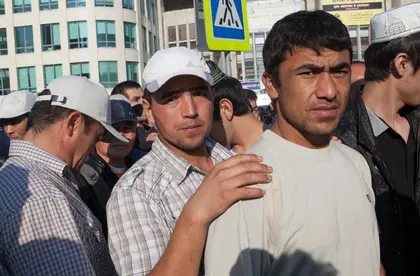Russian ultranationalist milbloggers continue to employ virulently anti-migrant rhetoric and call for xenophobic domestic policies, but in doing so are exposing the inherent hypocrisy in Russia’s treatment of its own indigenous ethnic minority communities.
Several ultranationalist milbloggers seized on an April 5 post by the Leningrad Oblast House of Friendship cultural center for awarding the local “Khorezm” Uzbek cultural organization with a grant for its work in “harmonization of interethnic relations and support for small indigenous peoples of Leningrad Oblast.”
JOIN US ON TELEGRAM
Follow our coverage of the war on the @Kyivpost_official.
Several milbloggers retorted that Uzbeks are not indigenous to Leningrad Oblast and questioned why an Uzbek cultural organization received an award from the Leningrad Oblast budget. One milblogger emphasized that Leningrad Oblast has formally defined Vepsians, Vods, and Izhorians as the ethnic groups indigenous to Leningrad Oblast.
Another Russian milblogger published a post on April 9, which was later amplified by a Telegram channel affiliated with imprisoned Russian former officer and ultranationalist commentator Igor Girkin, calling the domestic situation in Russia a “migration catastrophe,” accusing migrants of attacking the Russian domestic rear and of “unleashing ethnic, economic, and religious terror against indigenous citizens of the Russian Federation of all ethnicities.”

Update: Russian Rescue Flotilla to Syria Still Far From Destination
The milbloggers who criticized the Leningrad Oblast authorities and the post amplified by the Girkin-affiliated channel all narrowly define Muslim migrants from Central Asian countries as an explicit threat to “indigenous Russians.”
This same ultranationalist community, however, has been inconsistent and hypocritical in selectively defining who it believes to be an “indigenous Russian,” and the actual indigenous populations of Russia’s ethnic minority republics have faced discrimination and poor treatment at the hands of ethnic Russians, particularly against the backdrop of the war in Ukraine.
Russian milbloggers have criticized Tuvans, an ethnic minority group indigenous to Siberia, for using indigenous Tuvan orthography on road signs, while accusing Tuvan activist groups of inciting “ethnic discord” in Russia.
The Kremlin has also heavily relied on the more geographically remote and economically disenfranchised Russian federal subjects, many of which are indigenous ethnic minority republics, to disproportionately bear the brunt of mobilization for the war in Ukraine to protect ethnic Russians in major population centers such as Moscow and St. Petersburg from high casualties and the realities of the war.
Indigenous Buryat, Kalmyk, Tuvan, and Sakha activist organizations have spoken out against the Kremlin’s heavy reliance on ethnic minority indigenous populations for force generation purposes. Russian authorities have also been trying to undermine cultural identity in the Republic of Tatarstan through amendments to state national policy that remove provisions on “strengthening Tatarstan’s identity.”
Russian ultranationalists’ anti-migrant rhetoric, which has increased exponentially following the March 22 Crocus City Hall terror attack, has exposed gaps in the Kremlin’s already strained relationship with migrant communities within Russia.
The Kremlin is likely struggling to balance appeasing the anti-migrant calls of ultranationalist commentators, who comprise a major Kremlin support base, with its reliance on migrants and ethnic minority communities to fill roles both on the battlefield and in the domestic labor economy, as ISW has previously assessed.
See the original here.
You can also highlight the text and press Ctrl + Enter






